New Scott Solace eRide promises two terrains for one frame
Scott’s new e-bike platform comes in either road or gravel spec on the exact same frame
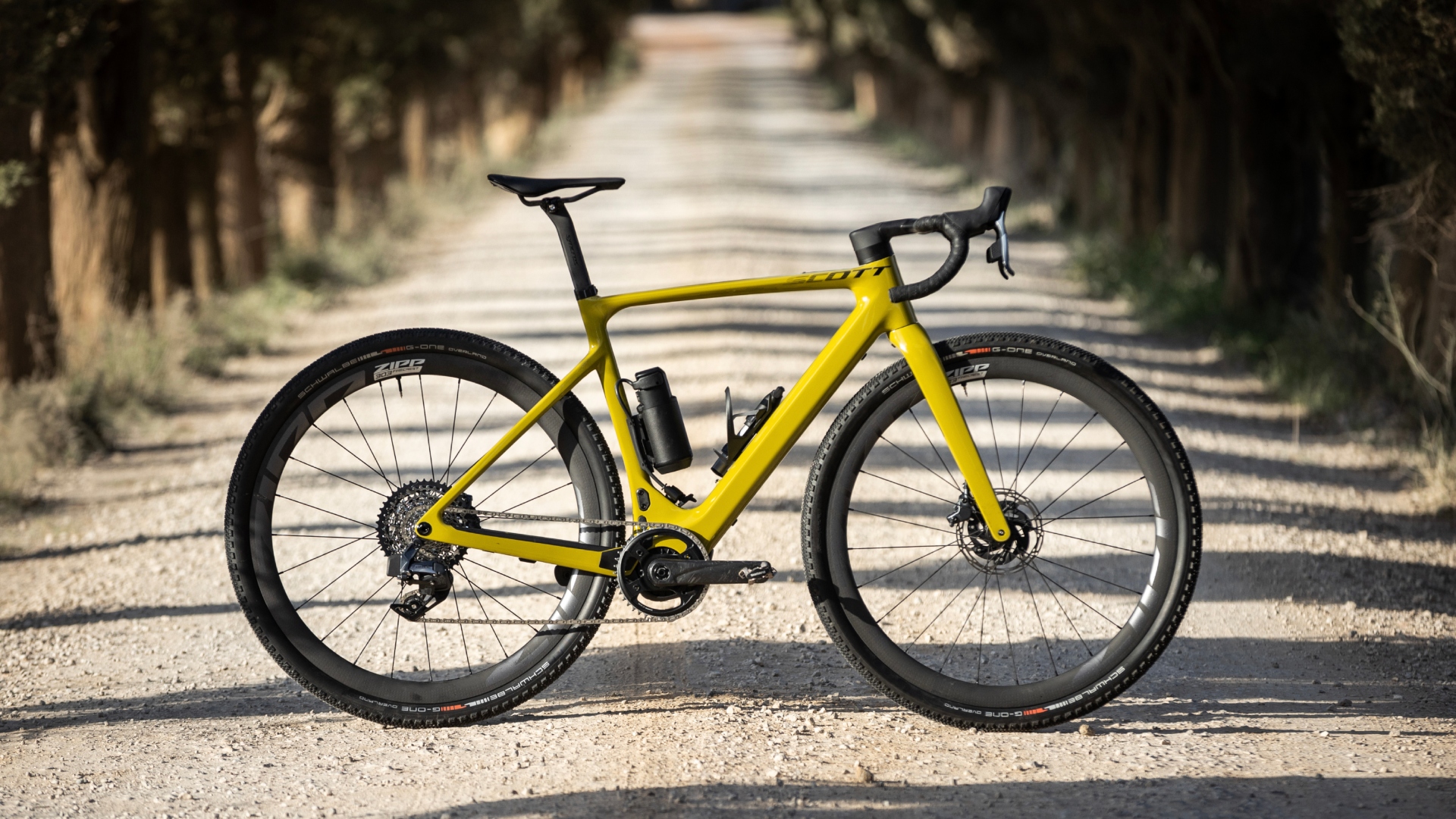
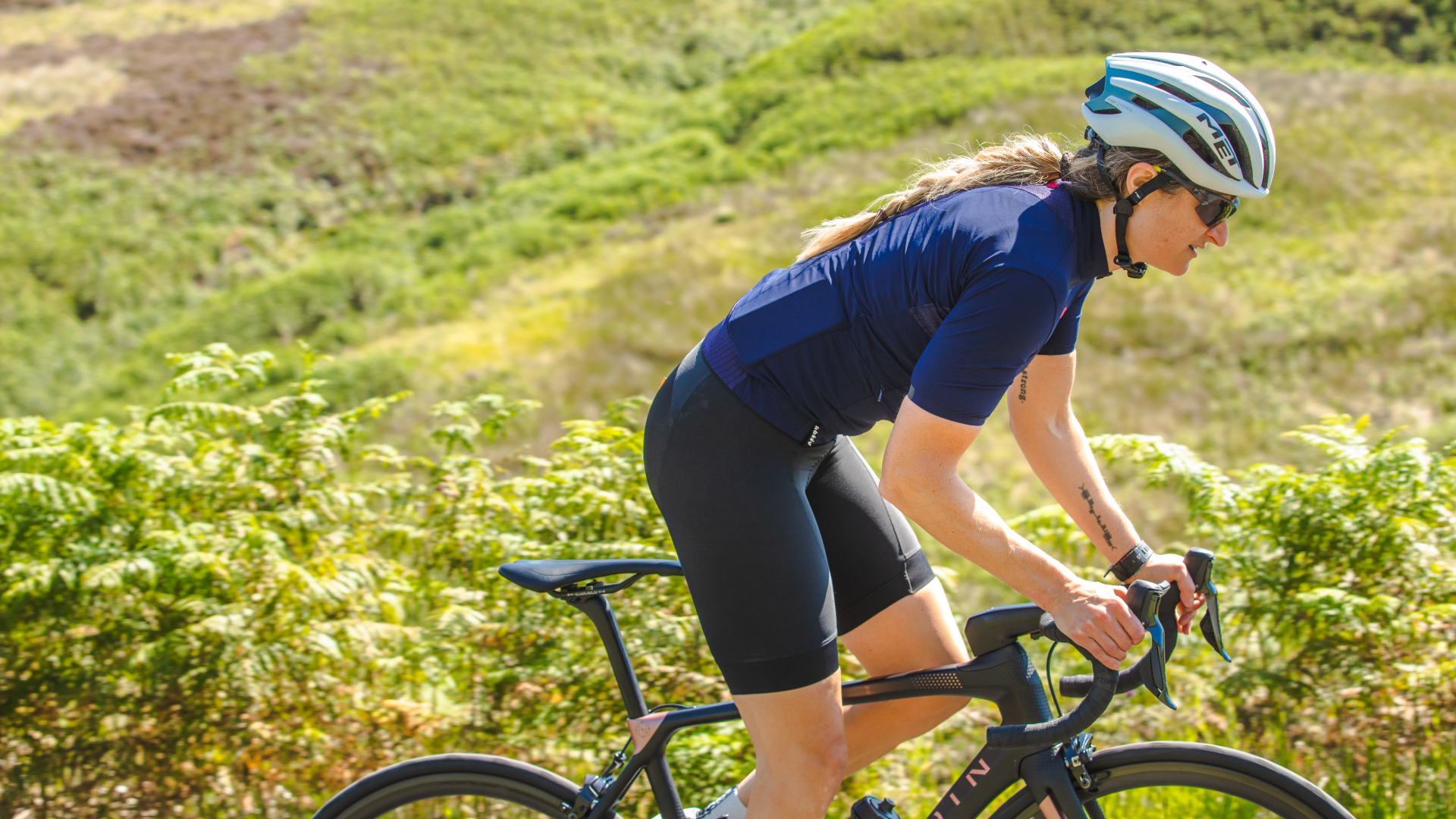
It's been 10 years since Scott first launched its endurance-focused Solace range. It was riding a new wave of bike that, shock horror, wasn’t solely focused on being lighter, stiffer and faster.
In fact, the industry was highly sceptical of more relaxed geometry on road bikes, let alone adding disc brakes or expanding tyre clearances to create ‘gravel’ bikes.
And of course decade ago electric bikes weren't really a thing.
Now here comes another new category - the Scott Solace eRide, both an endurance road and gravel platform, two e-bikes in one.
Scott says the e-bike aspect was at the core of the design, rather than it being a branch line off a standard road or gravel bike. Unimaginable two years ago let alone 10.
According to the brand, the project was to target low weight, silence, compactness (battery and motor specifically) and comfort. All nice aspirations, but engineering headaches, or 'simplexcity' as the team behind the design called the conundrum when trying to deliver one frame with two purposes.
Geometry
Rather than building on the previous endurance geometry of the Solace, the Scott engineers looked to the newer Addict Gravel, which was launched a couple of years back.
Get The Leadout Newsletter
The latest race content, interviews, features, reviews and expert buying guides, direct to your inbox!
The closeness of the geometry to the Addict Gravel tells us that the Scott Solace should be a very athletic ride, with a slightly more upright ride position and thanks to a slightly longer tail end, with 435mm chainstays compared to the Addict Gravel's 425mm, just a little more stable on the road.
In other words, the new Scott Solace eRide is a long way from the comfort endurance bike of old, with the Solace name really the only legacy.
Speaking at the launch, lead engineer Ignacio Alvarez confirmed that the brand "utilised the stability and proven excellence of the Scott Addict Gravel"
The carbon frameset keeps the same geometry throughout the range, and is available in sizes XS49 to XL58.
"We then added the new lightweight TQ HPR50 drive unit and further increased the tyre clearance," Alvarez said.
Frame
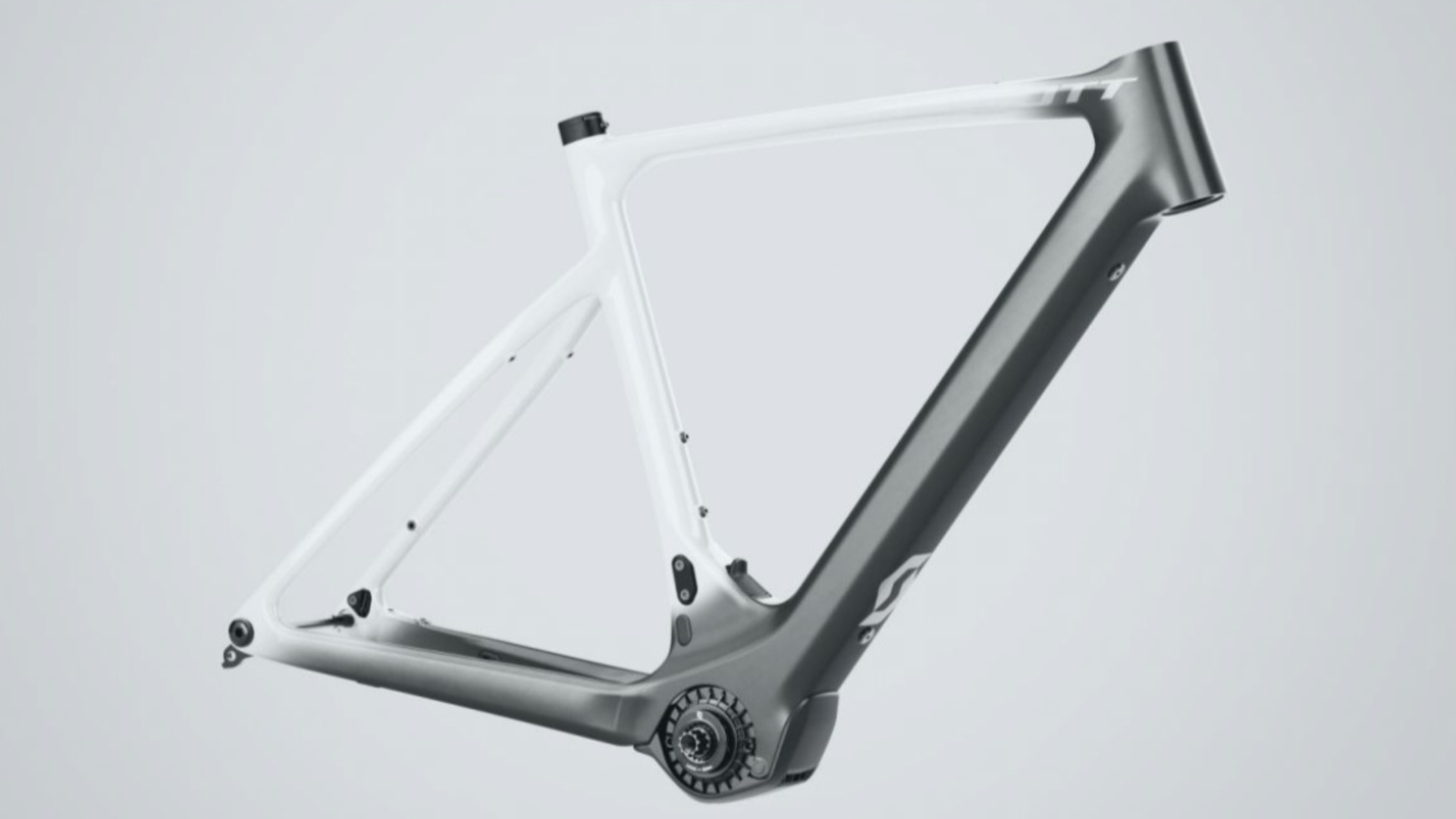
The 'zones' of the Scott Solace, comfort highlighted in white and stiffness in black.
Waxing lyrical about 'comfort and stiffness zones' feels a little unnecessary given Scott’s proven carbon expertise.
What does need talking up, however, is the absence of a conventional bottom bracket, and the amount of impressive engineering that's gone into doing away with arguably the stiffest zone requirement of the entire frame.
The reason for the removable undercarriage is to allow the insertion, or removal, of the battery and motor into the frame.
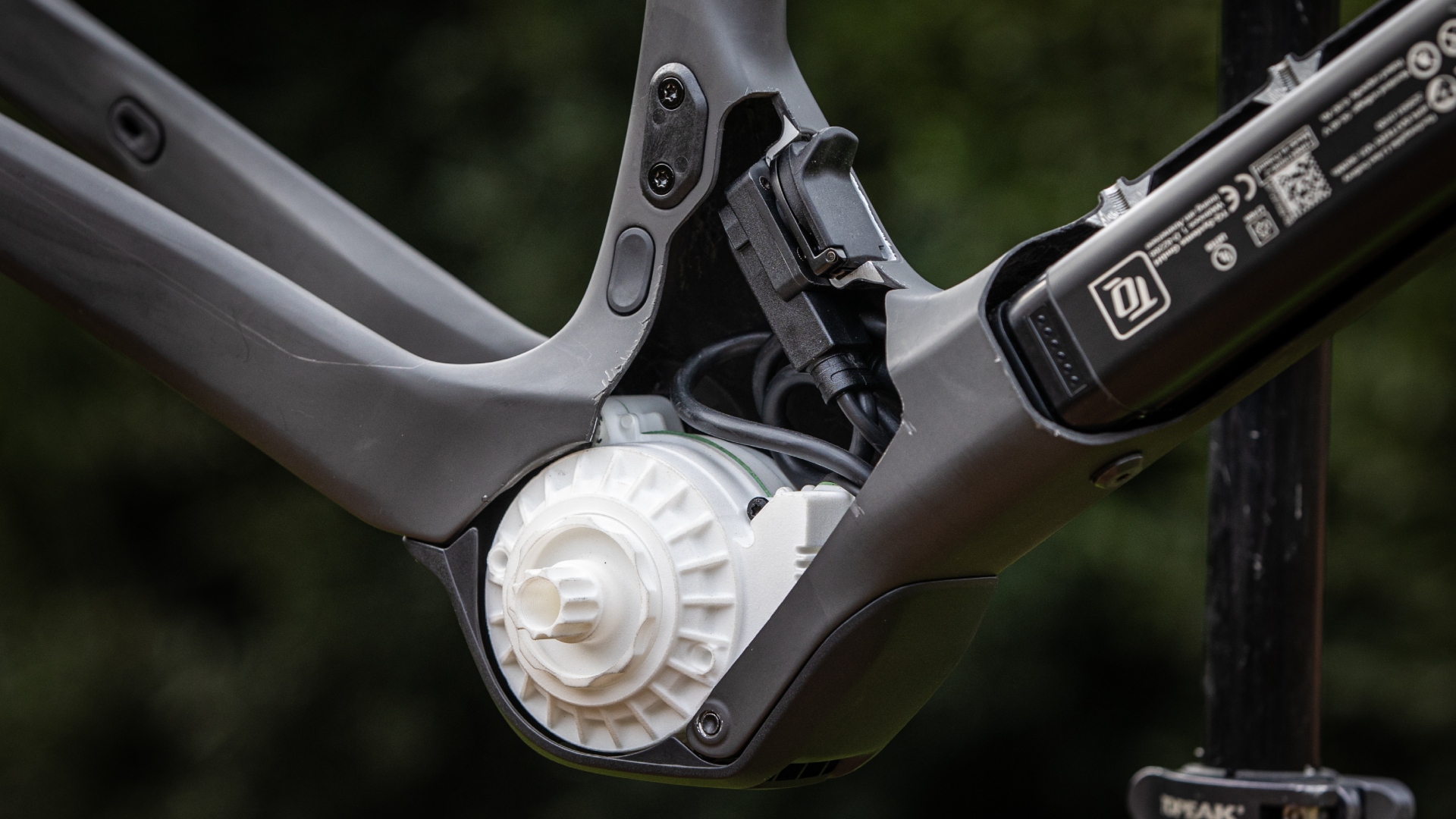
The TQ-HPR50 batter and motor locations in the Scott Solace frame
The entire removal of this section has required additional carbon in order to maintain the same structural integrity as a traditional bottom bracket shell.
But it’s this design and electric system that enables the Solace to fundamentally look nothing like an e-bike, and, while we're still awaiting official weights, to be light enough to ride for extended periods without the e-assist.
Motor and battery
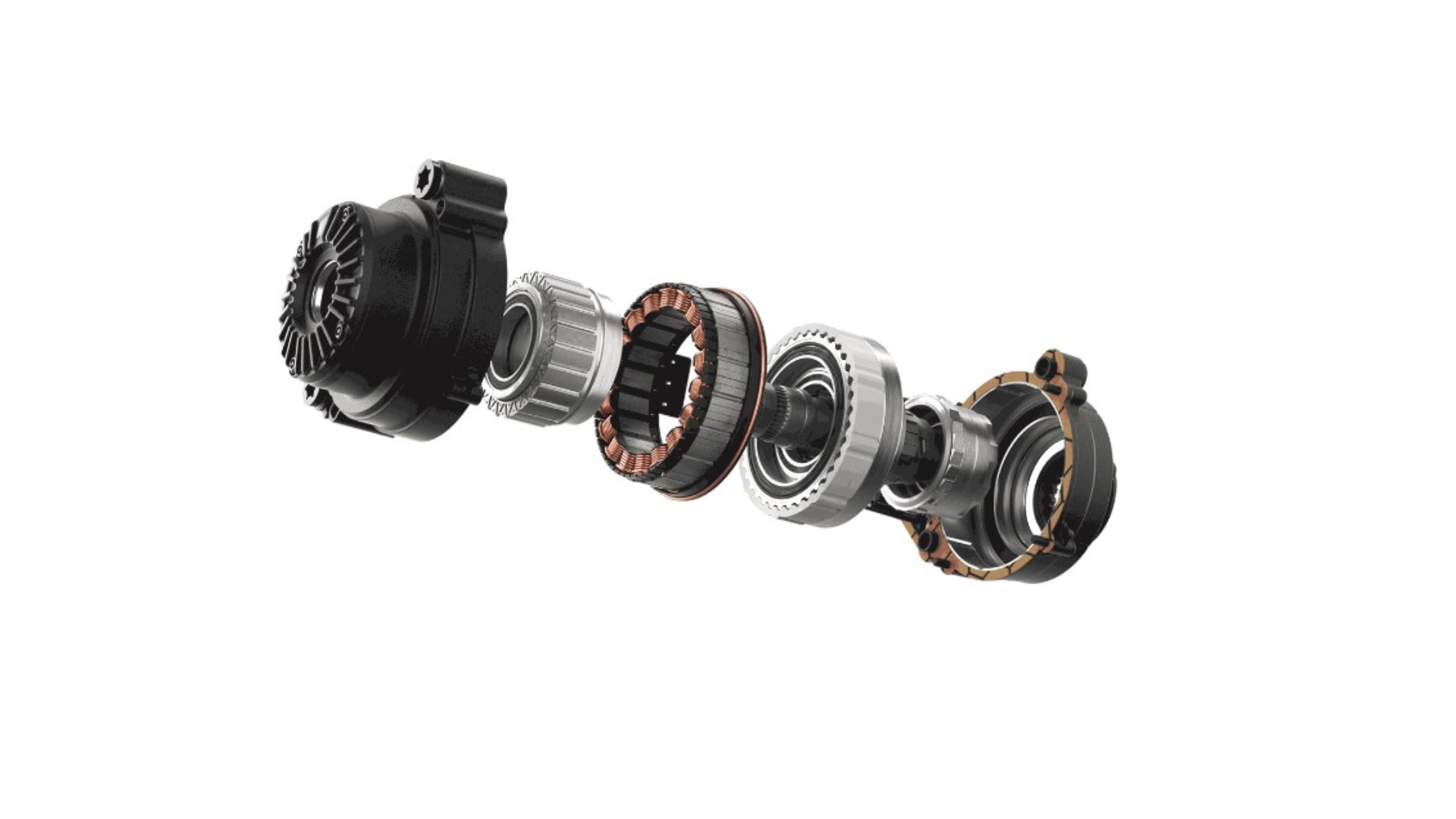
Breakdown of the TQ HPR50 motor
German brand TQ's latest drive and battery system the HPR50, which the Scott Solace eRide is equipped with, uses its own patented transmission, and weighs a claimed 1,850g.
Its bottom bracket-located 'Harmonic Pin-Ring' motor does away with the cogs and wheels that traditional electric bike motors use, replacing it with a harmonic'drive gear. It's not specifically new science, they've been around since the 1950s but the application to e-bikes is relatively fresh.
It's a departure from the Mahle drive unit and battery that we saw on the Addict Gravel eRide, and, according to the brand, has taken a year and a half of working in partnership, and three prototypes to get right.
With a 360Wh battery and integrated display, TQ says it has created the lightest e-bike system in its category weighing just 3,900 grams.
For example, it's around 50 per cent lighter when compared to e-bike industry leaders Bosch, who currently quote 3-4kg for an electric motor and same again for batteries for a typical set up.
How TQ has achieved this is apparently down to the brand's experience of developing electric motors used in robotic applications, including a Mars Rover or two.
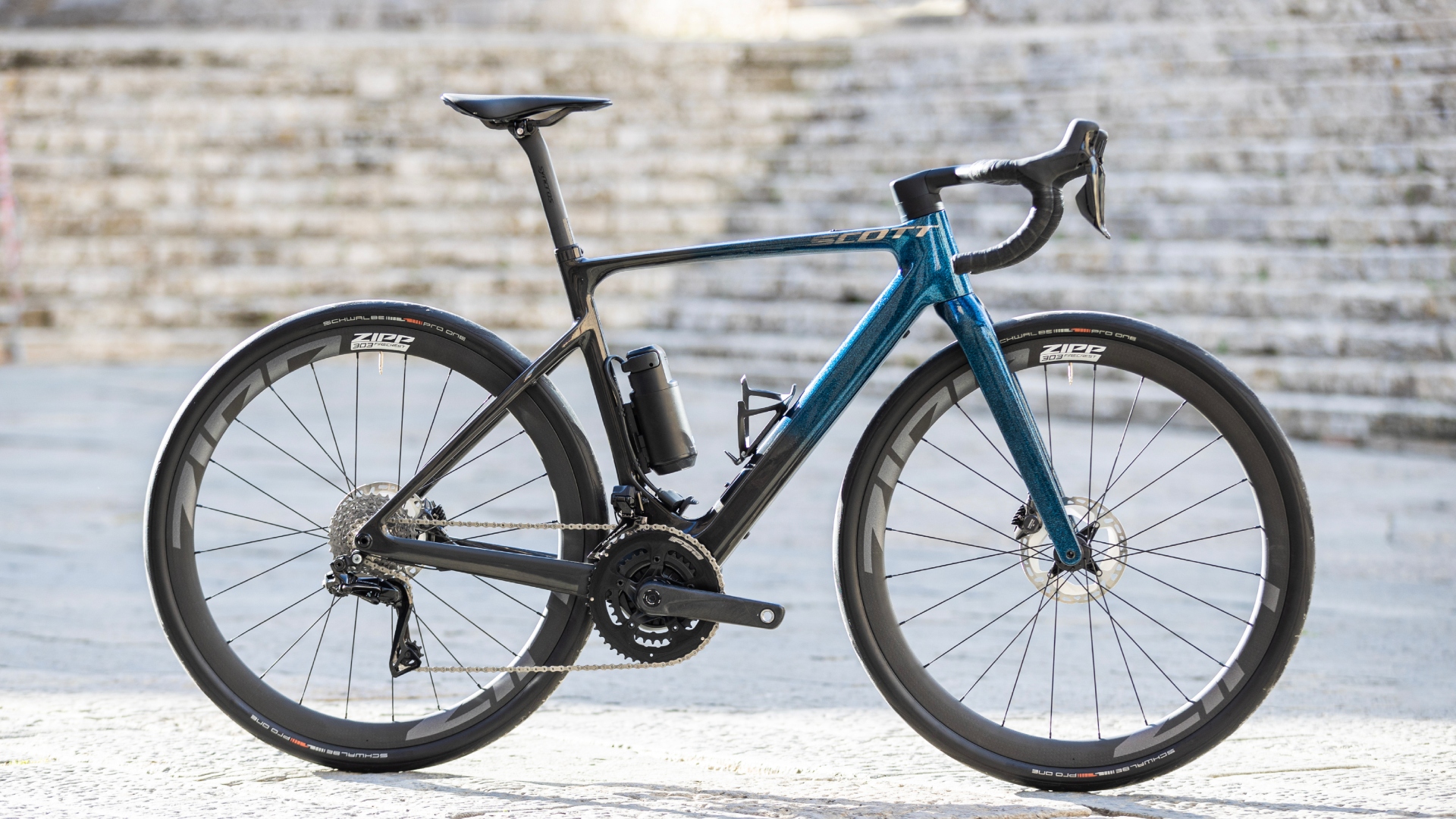
Scott Solace eRide 10 road
It's the same set up as the new Trek Domane+ SLR e-bike and new BMC Roadmachine 01 AMP X e-bike use, and our siblings over at MBR saw it when they landed the Trek Fuel EXE first ride review, commenting on the TQ motor being easily the quietest on the market to date.
Control of the system is via the integrated display, which sits nestled in the bike's top tube. Removing your hand from the bars and eyes off the road or trail to toggle the power settings for me is somewhat questionable at best.
Scott says that the virtual set up, via an app on your smart phone, is easy and is also compatible with ANT+ and Bluetooth, so easy to pair with your Garmin, Wahoo etc.
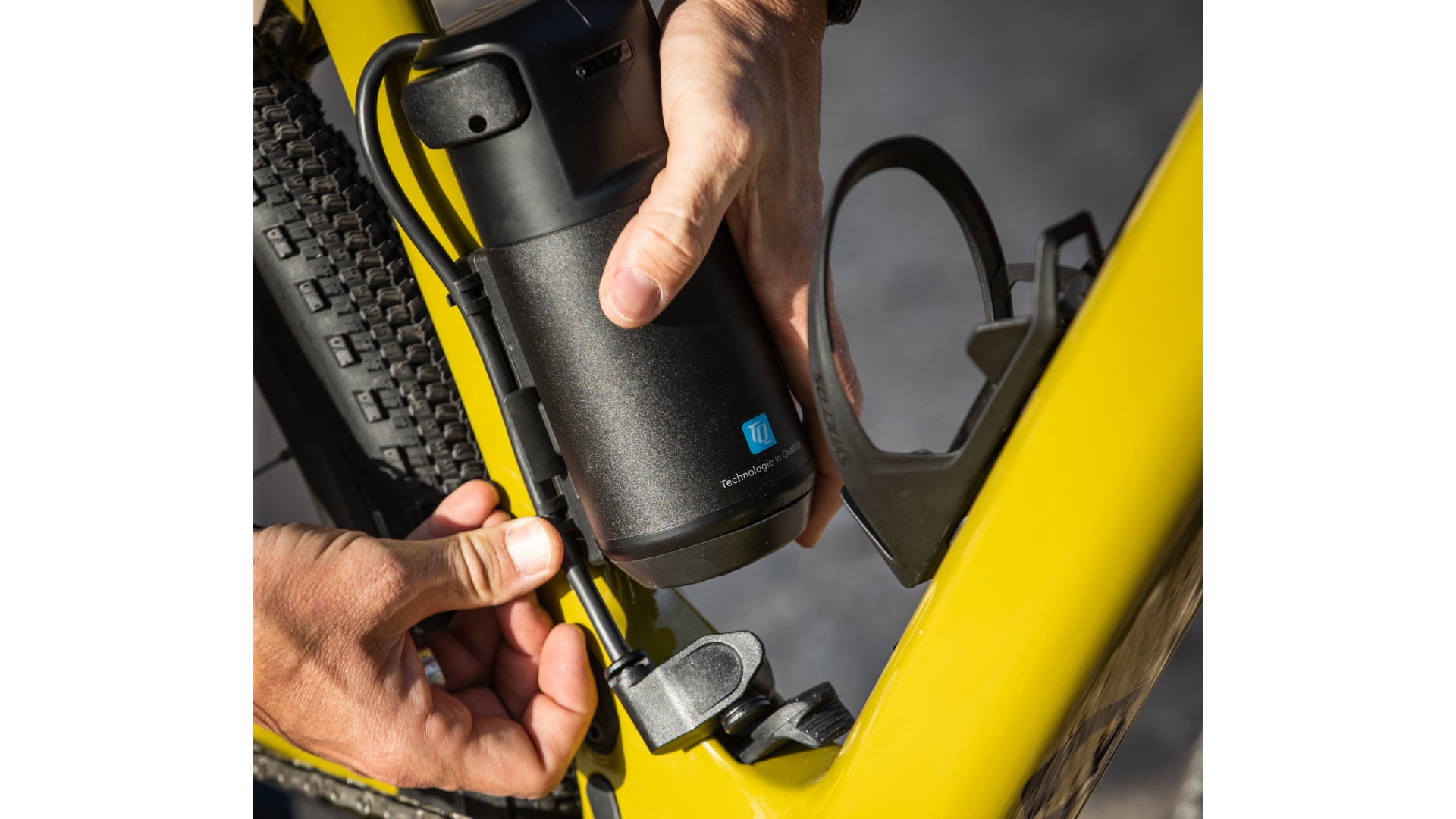
The a 160Wh range extender can fit any water bottle cage.
TQ claims that from empty to fully charged you're looking at around about 2.5 hours' wait time, plus an hour if you want to clip on a 160Wh range extender battery, which is neatly designed into a 500ml water bottle to fit in to any bottle cage and plug into the bike's charge point at the bottom bracket area of the seat tube.
How long or far the power assist gets you depends on a lot of different things. We cover more of that in our first ride story, but as with any e-bike, there are so many variables. Everything from rider weight, terrain, road or trail surface, even tyres, temperature and wind play a huge role in the range you'll get.
Specifications
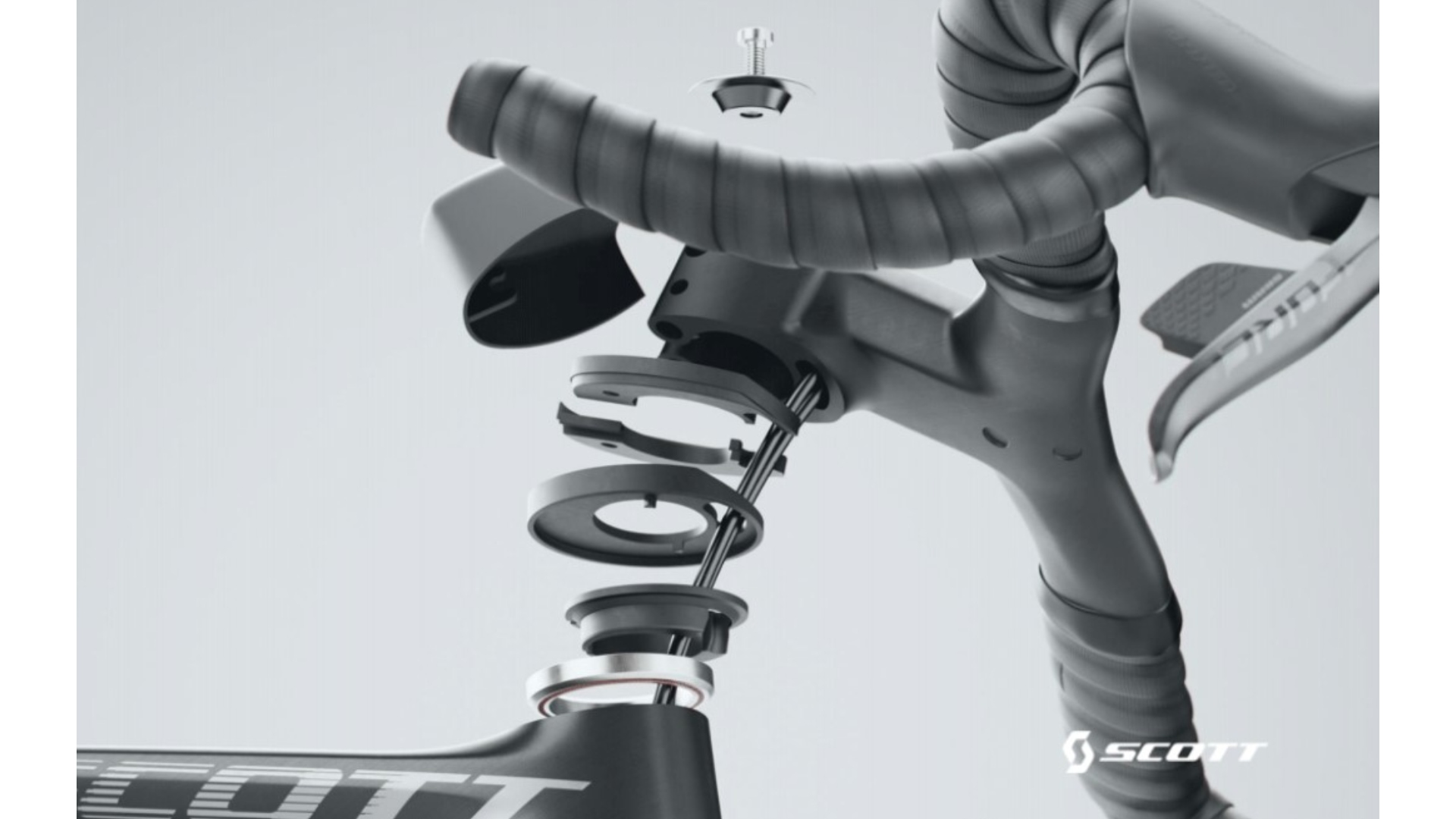
All Scott Solace eRides gain internal cabling
It's the build that decides what direction the Scott Solace takes, and the level of spec depends on where it sits in the range.
Both range toppers, the the Solace eRide 10 and the Solace Gravel eRide 10, get the carbon HMX framesets, Zipp 303 carbon wheelset and a range extender battery as standard.
On the gravel side of the house, the Gravel eRide 10 gains a SRAM Force XPLR eTap groupset, a 1x 42t chainring and a 10-44 12-speed cassette, wireless electronic shifting and hydraulic disc brakes.
When it comes to the road, the Solace eRide 10 gets mostly Shimano Dura-Ace Di2, but with 50/34 FSA chainrings and a 11-34 12-speed cassette.
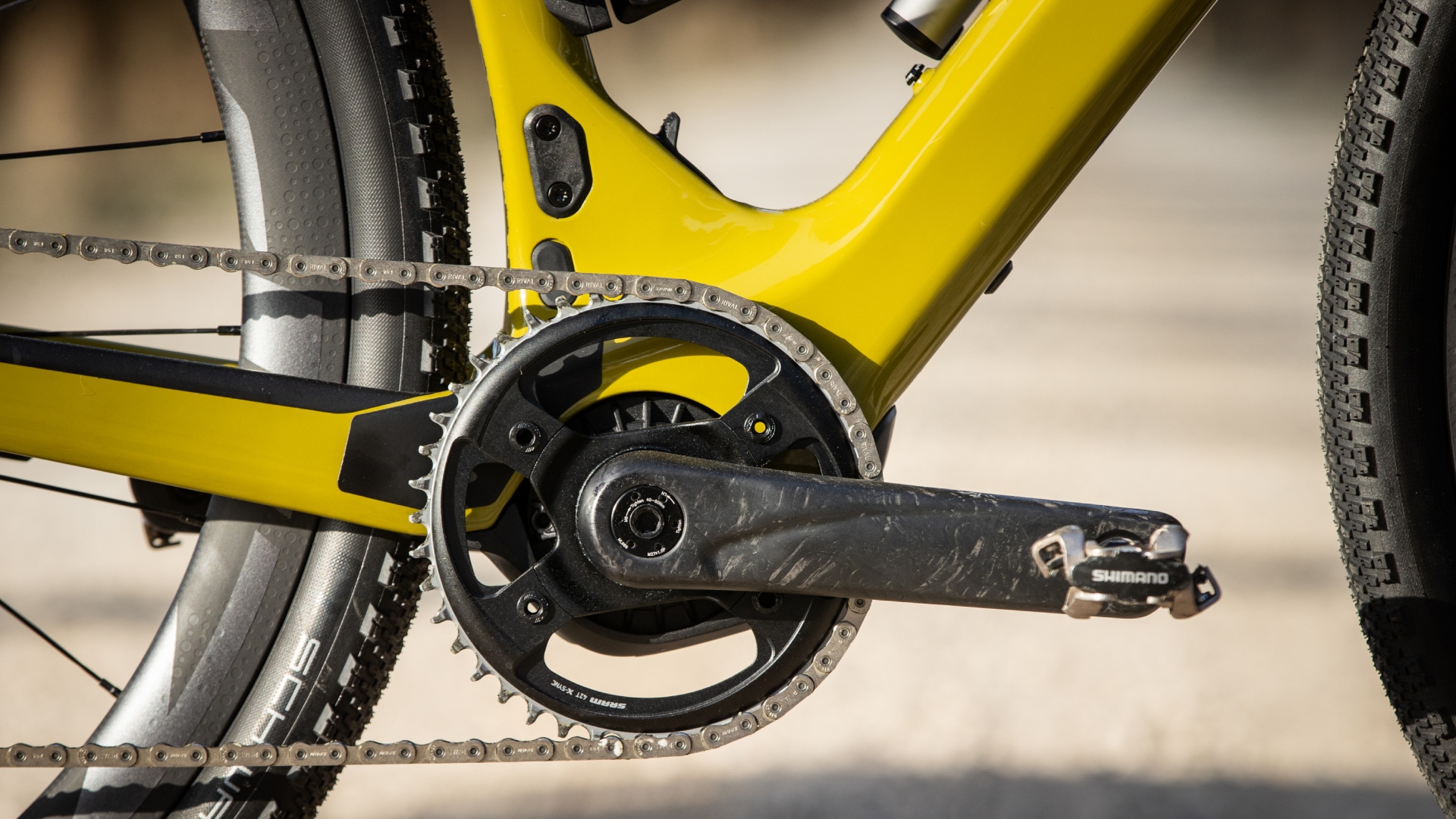
The TQ motor uses a bespoke spline pattern, so needs non-standard cranks in order to fit.
The eagled eyed will have noticed the unbranded cranks on both bikes.
The final versions will be FSA e-bike carbon bespoke, since the splines on the motor shaft are TQ propriety.
Scott confirms that any crank with an ISIS interface that's approved for the TQ system can be mounted, although you'll still need the Q-factor verified to make sure the cranks don't touch the frame.
Touchpoints on both the gravel and road eRide 10s use Scott's own-brand Syncros components, with the range-topping integrated carbon Creston IC SL cockpits, Syncros saddles, Belcarra Regular on the road and Tofino Regular for gravel, both mounted on Duncan SL Aero seatposts.
The Zipp 303 Firecrest wheels are equipped for their relevant roles, with the gravel shod in 50c Schwalbe G-One Overland tyres, while the road gets the 38c Schwalbe Pro One variety.
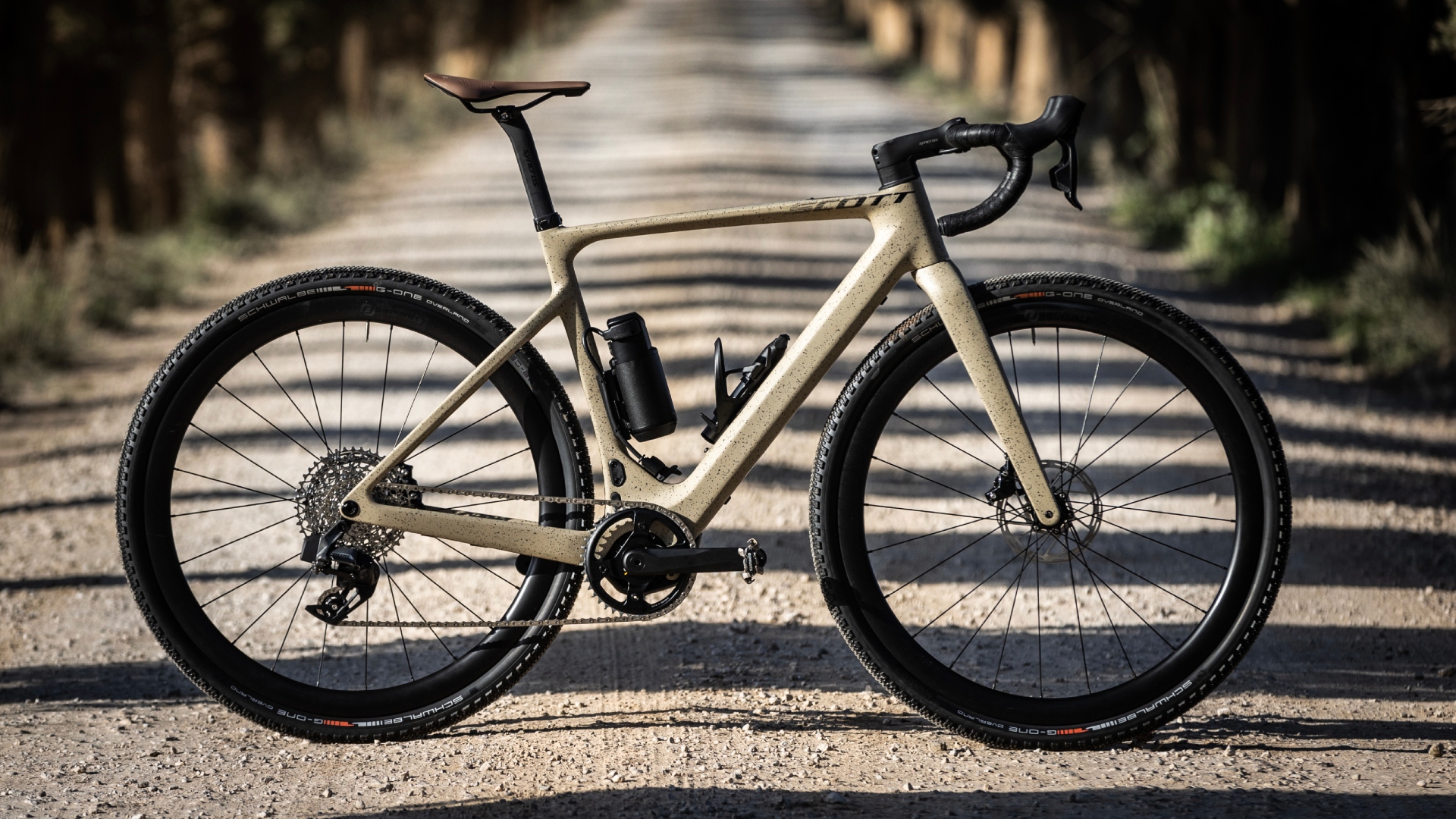
Solace Gravel eRide 20
As to be expected, go down the range on both sides and the spec is adjusted to suit the price points accordingly.
Again, both the Solace Gravel eRide 20 and Solace eRide 20 start with the carbon HMX framesets, but this time roll on Syncros carbon wheelsets. If you're after the range extender battery, you'll have to splash out for an aftermarket one.
The Solace Gravel eRide 20 comes equipped with SRAM Rival XPLR eTap AXS, which is still wireless, and hydraulic disc brakes, and runs a single 42t chainring and a 10-44 12-speed cassette.
The road version gets Shimano Ultegra Di2, with a FSA carbon crankset with double 50/34 chainrings, and an 11-34T cassette.
Both the Solace eRide 20 (gravel and road) come equipped with Scott's own Syncros carbon-rimmed Capital 1.0 40mm wheels. The Gravel 20 keeps the 50c Schwalbe G-One Overland tyres, while the road 20 keeps the 38c Schwalbe Pro One tyres.
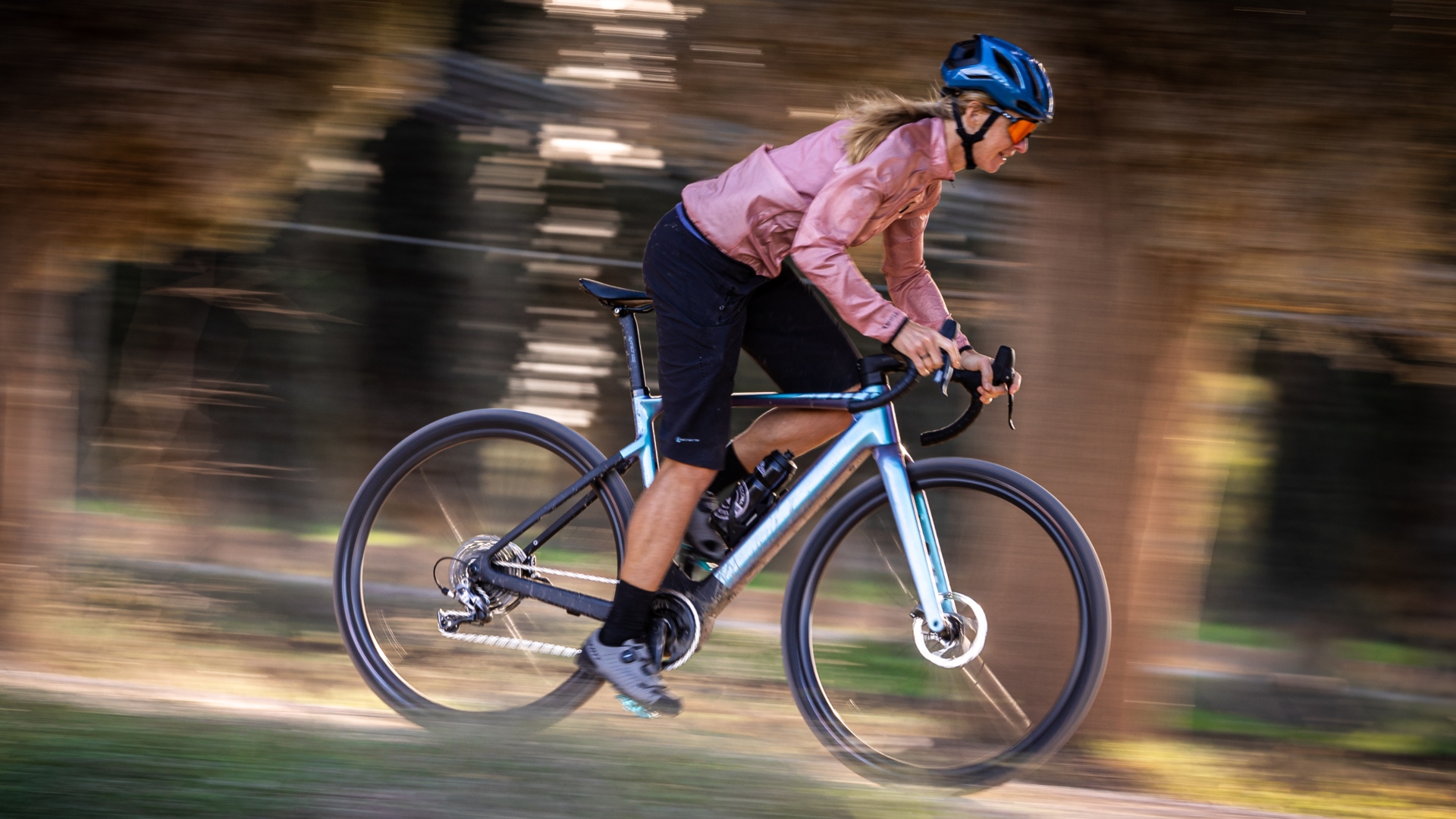
Scott Contessa Solace Gravel eRide 15
While the road versions stop at the models above, the off-road line-up also gains the Solace iRide Gravel 30 and a Contessa Solace eRide Gravel 15.
Both keep the carbon HMX frameset, but the specs are lowered to SRAM Rival 1x mechanical 11speed (42t, 11-42) with alloy FSA eBike Crankset, Syncross Creston 2.0 X alloy bars and stem, and Syncross Capital 2.0 25e Disc wheelsets, although both are shod in the same 50c Schwalbe G-One Overland tyres.
The main difference between these two bikes is the colours and sizing, with the Gravel eRide 30 available in XS49 to XL58, where as the Contessa starts at XS49, but only goes up to a L56.
But is it really two for the price of one?
OK so you don't have to be Katherine Johnson to notice that the flaw in the entire two-for-one plan does require a groupset swap in order to make the Solace eRide road a gravel variety and vice versa.
It's made overly complex by the whole non-standard spline issue, meaning that, for now at least you're stuck with the cranks that come with the bike.
This may, however, overcome the issue of the previously written off idea of swapping Shimano between the road Dura-Ace or Ultegra to its gravel-specific GRX groupset due to the wider, by 2.5mm, GRX crank’s Q-Factor.
As long as you're cool with the crank length, then I can't see why this wouldn't work, and Shimano has confirmed that the shift levers, chains, brake calipers, bottom brackets, cables and housing, and Di2 batteries would all be compatible between the two systems.
Looking at converting the Solace gravel to road seems to be just as easy. According to SRAM: "All AXS road chainring combinations are compatible with the 36t-max Force AXS rear derailleur".
That said, you'll need to be aware of either a defunct front mech if you go road to gravel, or not having one at all if you opt for gravel to road.
Pricing
For comparison, BMC's Roadmachine 01 AMP X is priced between $7,899/£7,200 and $8,899/£8,100, while the new Trek Domane+ SLR e-bikes start at $8,999/£8,340 and go up to $12,999/ £12,500.
As well as impressive carbon knowledge, Scott is known for its premium prices and the opening (provisional) $11,999.99/£10,999 for the Solace eRide 10 (road) is just that.
The Solace Gravel eRide 10 does come in slightly lower at $10,099.99/ £9,199, as the SRAM spec isn't as top end as the Shimano road variety.
Comparing these to the BMC and Trek directly and they sit firmly in the middle. The road Dura-Ace Di2 Solace eRide 10 looks almost value for money when comparing against the Trek Domane with a similar spec.
Looking across to the BMC Roadmachine 01 AMP X, which also comes equipped with SRAM Rival XPLR eTap AXS groupset, and it looks pricey - but factor in the Zipp 303's and it's right on par.
The full (provisional) range of prices are as follows:
- Solace eRide 10 $11,999.99 / £10,999 / €11,999
- Solace eRide 20 $7,999.99 / £7,299 / €7,999
- Solace Gravel eRide 10 $10,099.99 / £9,199 / €9,999
- Solace Gravel eRide 20 $7,499.99 / £6,999 / €7,599
- Solace Gravel eRide 30 $6,099.99 / £5,499 / €5,999
- Contessa Solace Gravel eRide 15 $6,099.99 / £5,499 / €5,999
Using exactly the same motor, battery and control systems throughout means that performance between these top brands is going to be really similar.
The electric bike legislation limits also means that their top speeds will be exactly the same too, with a maximum assist of 15.5mph/25kp in the UK, for example.
Given this, the choosing between all the bikes is likely to come down to personal preferences of geometry, spec and for some riders, probably an allegiance to one brand over another, or perhaps even colour when it's this close.
That is of course assuming that you are after an e-bike with a singular purpose. With the Scott Solace you can legitimately consider a rebuild, which isn't beyond the realms of possibility if you are a semi capable DIY'er, or have a friendly bike shop. It could save you a fortune, giving you a road or gravel option for the price of a chainring (or two), cassette and a pair of tyres.

Thank you for reading 20 articles this month* Join now for unlimited access
Enjoy your first month for just £1 / $1 / €1
*Read 5 free articles per month without a subscription

Join now for unlimited access
Try first month for just £1 / $1 / €1
Hannah is Cycling Weekly’s longest-serving tech writer, having started with the magazine back in 2011. She has covered all things technical for both print and digital over multiple seasons representing CW at spring Classics, and Grand Tours and all races in between.
Hannah was a successful road and track racer herself, competing in UCI races all over Europe as well as in China, Pakistan and New Zealand.
For fun, she's ridden LEJOG unaided, a lap of Majorca in a day, won a 24-hour mountain bike race and tackled famous mountain passes in the French Alps, Pyrenees, Dolomites and Himalayas.
She lives just outside the Peak District National Park near Manchester UK with her partner, daughter and a small but beautifully formed bike collection.
-
 FDJ-Suez, SD Worx-Protime, Lidl-Trek confirmed for Tour of Britain Women as strong list of teams announced
FDJ-Suez, SD Worx-Protime, Lidl-Trek confirmed for Tour of Britain Women as strong list of teams announced18 teams set to take part in four-day WorldTour stage race
By Tom Thewlis
-
 Cyclists could face life sentences for killing pedestrians if new law passed in England and Wales
Cyclists could face life sentences for killing pedestrians if new law passed in England and WalesReckless cycling currently carries a maximum two-year jail term
By Tom Thewlis